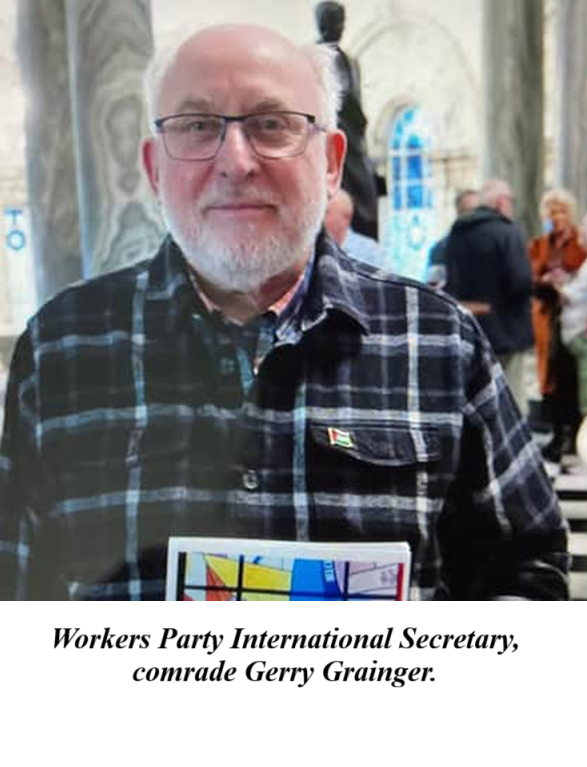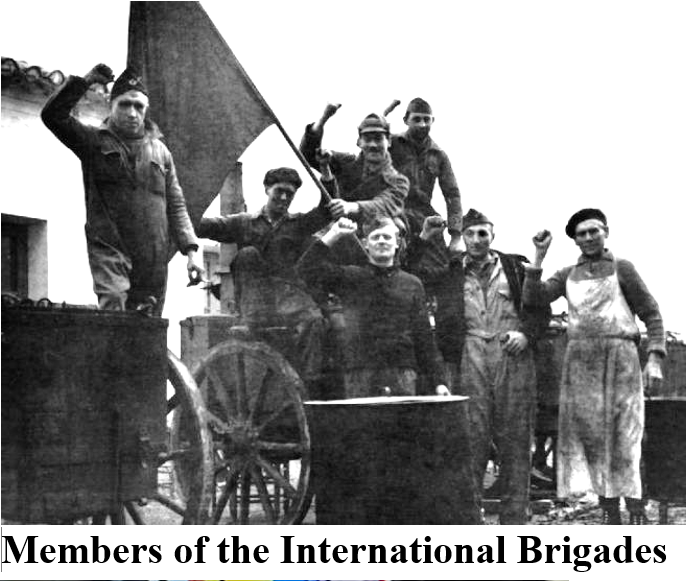Workers Party International Secretary Speaks at International Brigade Memorial event
The International Brigade Memorial Trust (IBMT) keeps alive the memory and spirit of the men and women from Britain, Ireland and elsewhere who volunteered to defend democracy and fight fascism in Spain from 1936 to 1939. This year, the IBMT held its AGM in Belfast in the first weekend of October. Over the course of the weekend IBMT held a series of social and educational events in the Unite headquarters and in the City Hall.
Speaking on 3 October in Belfast City Hall at the start of the Trust’s Annual General Meeting weekend IBMT Chair Jim Jump spoke about the roughly 250 Irish men and women joined the International Brigades to fight fascism in Spain, mostly as soldiers, but also as sailors or medics, one in four of whom was killed. Jump noted that around 50 volunteers came from Belfast, plus another 30 or so from elsewhere in the North. Mr Jump concluded by comparing the world of the 1930s with our situation in 2025: “We see 1930s-style social deprivation and inequality. Militarism and religious and ethno-nationalism are on the rise. Hospitals, women and children are being mercilessly bombed and killed in their thousands. And the drumbeats of world war grow louder. This would all sound depressingly familiar to the volunteers of the International Brigades. And this is why, in the IBMT, we do all we can, in schools, trade unions, political parties and the wider community, to make sure the example and inspiration of the International Brigades will never be forgotten and will be passed on to future generations”.

Mr Grainger said the Workers Party was privileged to participate in a very successful series of events in Belfast organised by the International Brigade Commemoration Committee which included the annual general meeting of the International Brigade Memorial Trust. (IBMT)
Mr Grainger said Irish and British members of the International Brigade fought at some key battles of the Spanish Civil War, including Jarama and the battle of the Ebro. Like their comrades in the International Brigades and in the Spanish Republican forces, the Irish volunteers fought bravely against the better-armed and better-trained fascist forces, who enjoyed the support of Nazi Germany and Fascist Italy.

The commitment of the people who went to Spain was mirrored by their supporters at home, who recruited volunteers, arranged transportation, raised funds, sent humanitarian aid, and argued on behalf of the Spanish Republic through political agitation, in the media, and at public meetings.
With fascist and rightist forces on the rise once more in many parts of the world, the example of the International Brigade is more important than ever. The volunteers of the International Brigades remain inspirational figures, especially to progressive young people and those determined to oppose fascism. This is as true in Ireland as elsewhere. They hold a central place in our progressive political and cultural life.
This weekend’s gathering with people from across Ireland and the UK, and indeed further afield, was a demonstration that these heroic sacrifices will never be forgotten.
The Spanish Civil War was a struggle between the forces of social progress and the dark forces of reaction. The heroic role of the International Brigades exemplified the essence of socialist internationalism, and this remains a vital constituent of our struggle. At a time of increasing imperialist aggression, the principles of solidarity, co-operation and proletarian internationalism assume ever greater importance. It is our duty to stand in solidarity with our comrades across the World.
We remain committed to that duty, expressed in one simple message: No pasaràn!
